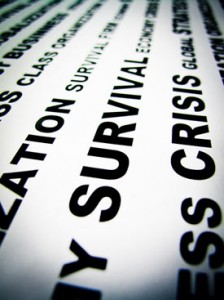 In today’s competitive economic climate, the small business world is a jungle. Small business failure rates have risen more than 40 percent in the past five years, and only the businesses that do the best job in managing expenses, marketing their products and seizing opportunities will prosper in this environment.
In today’s competitive economic climate, the small business world is a jungle. Small business failure rates have risen more than 40 percent in the past five years, and only the businesses that do the best job in managing expenses, marketing their products and seizing opportunities will prosper in this environment.
By maximizing the efficiency of your business, and keeping your eye on the ball you can avoid having your small business eaten by a bad economy or intense competition. Here are a few ways you can ensure that your small business stays on sound footing:
1. Keep an eye on costs – It goes without saying that you should keep a close watch on your business’ costs – everything from utility bills to payroll to inventory costs. If a cost makes a big jump, you may need to find a way to conserve resources or start shopping around for a cheaper alternative.
2. Provide excellent customer service – In an extremely competitive environment, the way businesses survive and prosper is to offer their customers an experience that other businesses can’t. Be sure to go the extra mile in serving your customers, and form friendly, professional relationships with them that encourages them to keep coming back to your store.
3. Maximize online potential – If your business doesn’t have a website, get one. If it has a website, make sure it runs smoothly and is uncluttered and easy to navigate. A website is a 24/7 advert for your business. Most people today use the web to find products and services they want, so not having a website or having a crummy one will lose you customers.
Also, if you sell products or services online, make sure the purchasing process is streamlined and secure, taking as few steps as possible to complete a transaction that is safe and secure from hackers or malicious software. Web users get very impatient with slow-running websites, so make sure your technical infrastructure is in good repair.
4. Increase employee engagement and productivity – Your work environment can make all the difference in the productivity of your employees and how they relate with customers. Be sure to have consistent policies, an open door policy and reward hard work and innovation in order to get the most from your work force.
5. Be willing to take smart risks – Owning a business means taking risks. If an opportunity presents itself, don’t reject it out of hand just because times are hard. Carefully evaluate the opportunity to see if it may be the gold strike that takes your business to a new level.
6. Be sure to meet your tax obligations – IRS penalties can sink a small business. As painful as it may be, always make sure that your tax  obligations are met.
obligations are met.
7. Borrow wisely – A silver lining in today’s economic environment is that interest rates are extremely low. If you have good credit, and need money to expand or grow, now is the time to borrow. By getting access to financing now, you can take advantage of these rates to grow your business at a much cheaper expense than you would if you wait for the overall economy to rebound.
Now may also be a good time to refinance existing debt to obtain lower monthly payments that free up some breathing space for your business if it is under pressure by debt commitments.
8. Marketing – Marketing remains a key concern, even in a bad business environment. Be sure to aggressively market your business, and use the free media resources available to your business such as social media and e-mail marketing.
Small business failure rates
There’s no question that times are tough for small businesses. In California, the small business failure rate is 69 percent higher than the national average. Small business failure rates in New Hampshire and Nevada are also high. Currently, some of the best states to run a small business in are the states benefiting from the energy boom, such as Wyoming and North Dakota.
Small business and entrepreneurship are vital to the U.S. economy, as the more than 23 million small businesses in the country employ more than 81 million people and are responsible for $6 trillion in revenues each year. The housing slump, weak consumer confidence and unemployment continue to create challenges for small businesses, however. Optimizing your small business can help you resist these downward pressures and ensure the prosperity and survival of your venture.









